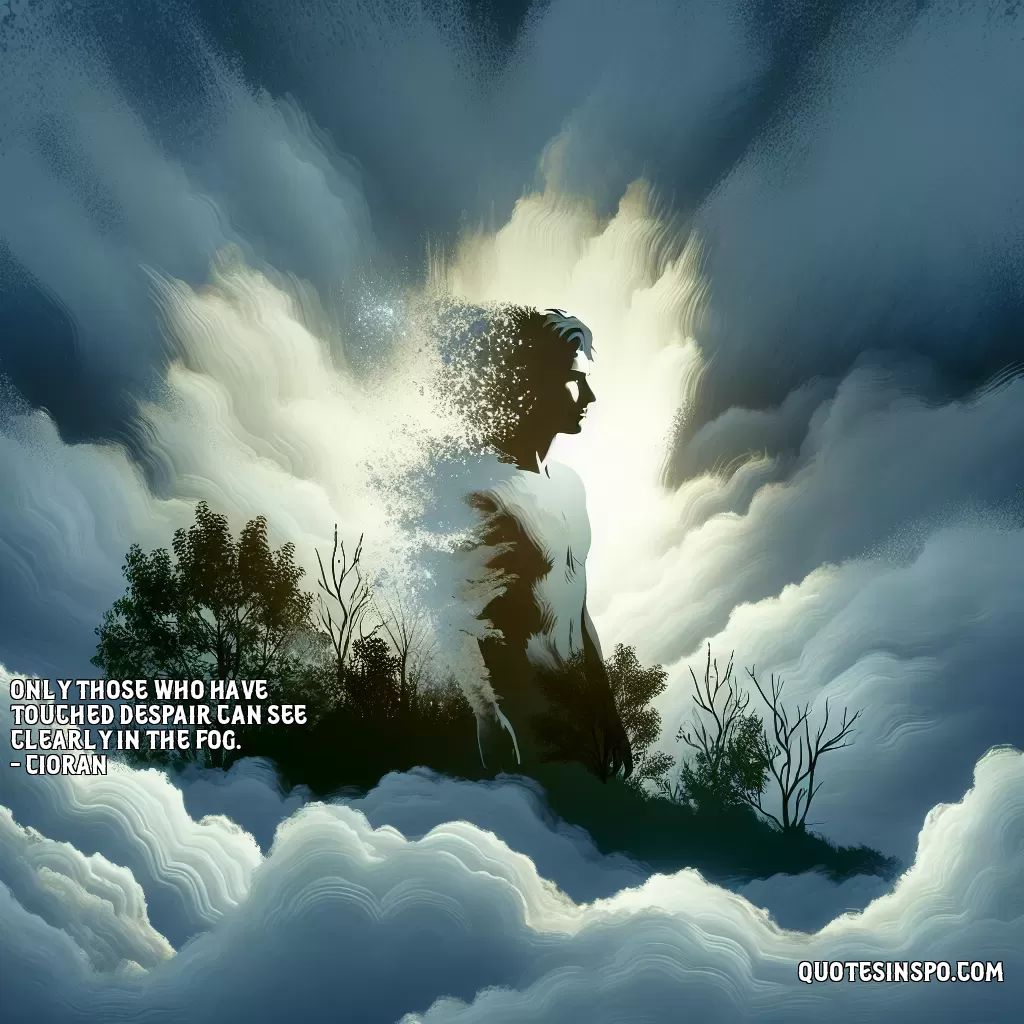
Only those who have touched despair can see clearly in the fog. - Cioran
The quote by Emil Cioran, "Only those who have touched despair can see clearly in the fog," suggests a profound insight into human experience and perception. Cioran, a philosopher known for his thoughts on existentialism and the nature of suffering, implies that true clarity and understanding often come from enduring deep hardships. The phrase "touched despair" signifies experiencing profound sorrow or hopelessness, times when one is engulfed by emotions that seem insurmountable. Such encounters with despair are deeply transformative. They strip away superficial concerns and illusions, forcing an individual to confront the bare essence of their existence and the world around them. It's through these experiences that people often gain significant self-awareness and insights into life's complexities. The "fog" represents confusion, uncertainty, and the ambiguities of life. Many people wander through life in a fog, unable to see things as they truly are, often clouded by societal norms, personal biases, or emotional distractions. However, those who have faced despair have been forced to look beyond these obscurations. Through suffering, individuals might gain a rare perspective that enables them to "see clearly," cutting through life's ambiguities with an understanding born from enduring and overcoming hardship. This clarity is not just about seeing the world more accurately but also about perceiving one's values, purpose, and relationships with renewed honesty and depth. Such individuals often possess a deeper empathy and understanding of the human condition, for they have dwelled in its darkest parts and emerged with wisdom.
Quote By: Cioran
Emil Cioran, born on April 8, 1911, in Rășinari, Romania, was a philosopher and essayist renowned for his profound exploration of existential despair and the human condition. Raised in a culture rich in contradictions, Cioran's early exposure to Romanian Orthodox orthodoxy and the heavy weight of existential thought greatly influenced his philosophical outlook. He studied philosophy at the University of Bucharest where he was exposed to the works of Nietzsche, Schopenhauer, and Kierkegaard, all of whom would shape his later writings.
Cioran's first major work, "On the Heights of Despair" (1934), showcased his distinctive style characterized by lyrical prose mingled with philosophical reflection. This early work lays the groundwork for Cioran’s pervasive themes of nihilism, anguish, and the absurdity of existence. In the tumultuous years leading up to World War II, Cioran's writing evolved, reflecting his deepening skepticism towards political ideologies and his disdain for nationalism. His later works, such as "The Trouble with Being Born" (1973) and "A Short History of Decay" (1949), illustrate his darker musings on life, death, and the futility of human endeavor, establishing Cioran as a pivotal figure in modern philosophical literature.
In 1937, Cioran moved to Paris, where he would live for the remainder of his life, adopting French as his literary language. His relocation marked a significant shift in his intellectual trajectory, as he interacted with existentialists and writers whose works resonated with his own disillusionment. In France, Cioran continued to publish numerous essays and aphorisms, earning acclaim for his incisive observations and stylistic flair. His philosophical ideas often conveyed a sense of deep melancholy, arguing that suffering is an intrinsic part of the human experience.
Emil Cioran passed away on June 20, 1995, in Paris. He left behind a rich legacy of thought that continues to influence contemporary philosophy and literature. Through his profound insights on despair and existence, Cioran challenges readers to confront their own lives with honesty and reflection, cementing his place as one of the 20th century’s most significant thinkers.